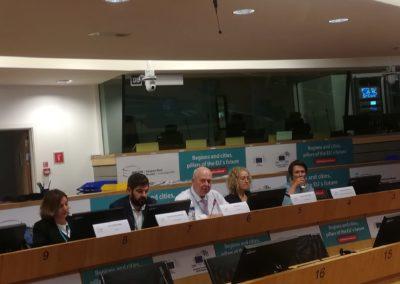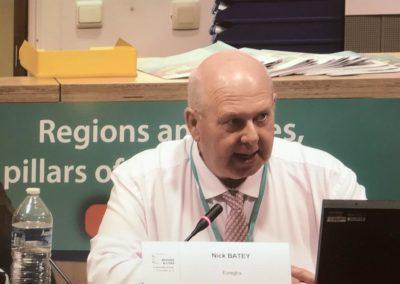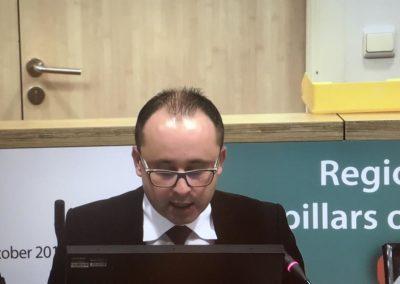On 9 October, EUREGHA organized the ‘SDGs for a healthy social Europe’ conference in collaboration with the European Committee of the Regions and the World Health Organization Regional Office for Europe, within the framework of the European Week of Regions & Cities 2019. With help from various speakers, the aim of the conference was to engage with European health stakeholders on how individuals and organisations should meet the SDG goals to ensure good health and well-being for European citizens.
The first session of the event was dedicated to the strategic perspective on how working across governance levels and breaking the silos benefits the procedure of reaching SDGs. During the debate, all speakers of the session (Christian Busoi, Birgitta Sacredeus, Leen Meulenbergs and John F. Ryan) agreed that securing a multi-layer approach by several parties is crucial in order to reduce inequalities in the European health sector. Bridges were built on the belief that no one should be left behind as it is important to recognize that healthy societies participate more in social and economic life. Eventually, a healthy society will result in more sustainability. Leen Meulenbergs underlined this by stating “Health is wealth”.
During the second session, speakers Ana Llena Nozal, Caroline Costongs, Cesar Velasco Munoz, Birgitta Sacrédeus, and EUREGHA chair Nick Batey, discussed the topics of good governance, communities, and investments. These are the three main pillars of health promotion and disease prevention. The session aimed to detect possible actions that regional and local health authorities can undertake to improve the EU healthcare system as well as change the behaviour of the patients through an “Economy of Well-being” approach.
The conference was concluded by Ossi Martikainen, Chair of the NAT committee, who highlighted that important improvement are made at local and regional levels; however, more partnership is needed to accomplish bigger outcomes. His closing words were “To succeed in making Europe the healthiest place alive, we need individual, societal, and global engagement”.
More information here.
Relevant document
Powerpoint: Economy of Wellbeing for Health – Ana Llena Nozal







